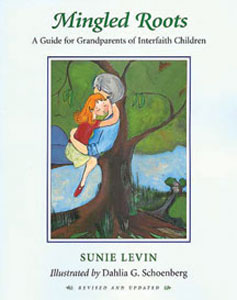 “I go to Grandma and Grandpa Brown’s for Christmas, help trim the tree, sing carols and then get a lot of presents. And then we go to Grandma and Grandpa Friedman’s to light the Chanukah candles, bake Chanukah cookies and get presents for eight nights,” bragged Josh Solomon, age 6, of New York City to one of his first-grade friends. “That’s not fair,” his friend responded, “I only get presents on one day.”
“I go to Grandma and Grandpa Brown’s for Christmas, help trim the tree, sing carols and then get a lot of presents. And then we go to Grandma and Grandpa Friedman’s to light the Chanukah candles, bake Chanukah cookies and get presents for eight nights,” bragged Josh Solomon, age 6, of New York City to one of his first-grade friends. “That’s not fair,” his friend responded, “I only get presents on one day.”
For Josh and other forward-thinking children, celebrating two holidays may simply seem more of a good thing. But for many parents and grandparents, the issue is more complicated. In fact, the question of how to integrate two religious traditions is likely to drive interfaith couples into counseling. They may minimize the problem when contemplating marriage, but when kids come along, the true emotions surface.
This can be especially tricky around the holidays, when thoughts turn to religion and family traditions. For grandparents of interfaith children, the December holidays can pose a special challenge. They are anxious to share their heritage. But how can they do so without alienating the children’s parents, confusing the kids or offending the other grandparents?
The main ingredient for a peaceful holiday is clear communication — first with your partner, then with your kids and both sets of grandparents. Before the season starts, set aside a time to discuss holiday plans. To what extent will you celebrate each holiday? Will you have a Christmas tree and a menorah? What traditions do you feel strongly about? Grandparents should let the parents know they will not try to convert or force their beliefs on the grandchildren. Sharing the grandchildren of two different religious cultures and visiting two different houses of worship is a tough balancing act for parents and grandparents.
You want your grandchildren to have a positive attitude toward the holidays. Have your grandchildren, step-grandchildren, your children’s in-laws and the parents over for a Chanukah party. Let them share the warmth and spirit in your home. You prepare the latkes, let the grandchildren make the Chanukah cookies. If you have the batter ready in the refrigerator, the children can roll it out and use cookie cutters with Chanukah symbols. Have some colored sugar and candies for decoration. It is satisfying for the child to find the one cookie he has made.
A family tree is another way of presenting Jewish heritage and history to a grandchild. Your history is one of the richest gifts you can give your grandchild. Make a picture album, adding new pictures each year. With younger children, tell the Chanukah story with stick puppets the children have made. Emphasize that Chanukah was the Jewish peoples’ first battle for religious freedom. When it’s time, light the candles in the menorah, say the blessing and sing songs. Don’t forget to have a rousing dreidel game; you can teach everyone how to play. You might have pennies or poker chips to play with and prizes for the winners. The message you’re transmitting is, we can all enjoy and share this holiday. At the same time you are passing down traditions of your Jewish heritage.
Don’t forget about equal time. If you are invited to a Christmas dinner at the other grandparents’ home or a Christmas play at school, make a special effort to go. Most important, don’t try to compete with the other grandparents at this time. This is their holiday, not yours.
Keep in mind that yours is not the only cultural heritage being passed down to your grandchildren.
Ideally, with a grandparent as a good role model, your Jewish heritage can help the child make a choice that will be a fulfilling identity.
Sunie Levin, MEd holds degrees in psychology and education. She has lectured and held workshops around the country, appeared on national T.V. and radio. Her book “Mingled Roots for Jewish Grandparents of Interfaith Grandchildren,” as well as her new book “Make New Friends Live Longer” are available at amazon.com and http://www.makenewfriendslivelonger.com.


